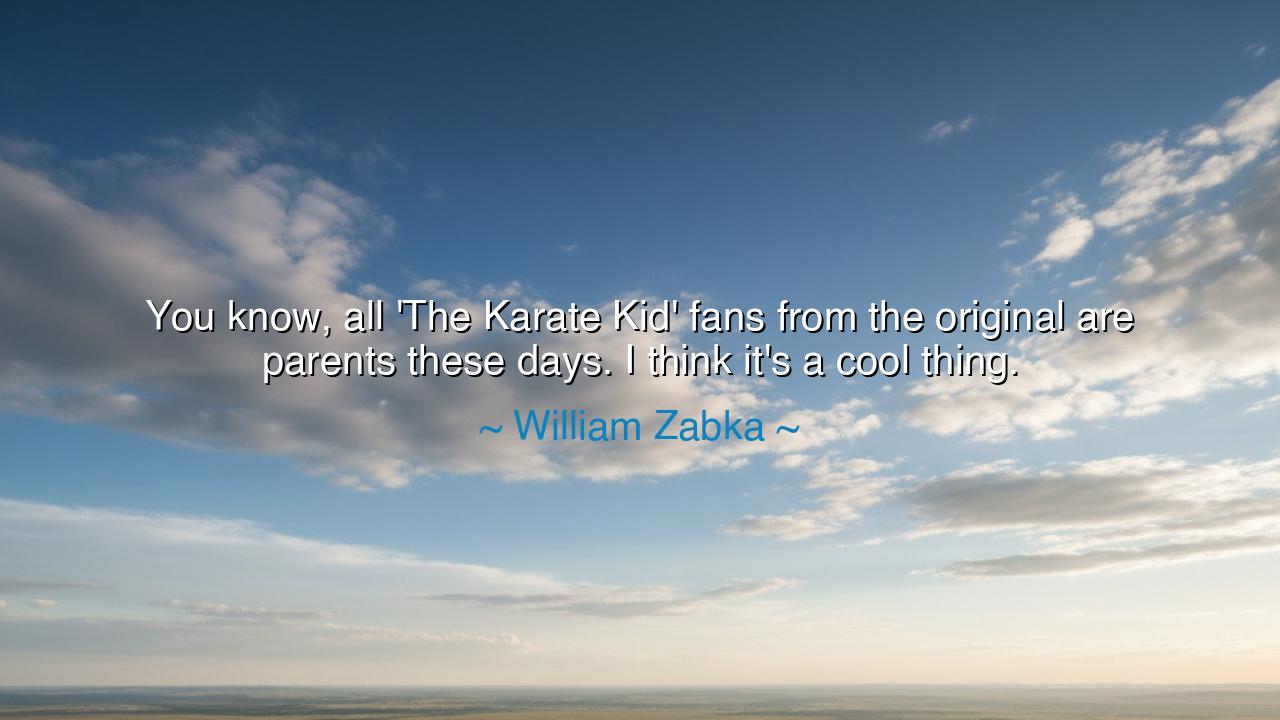
You know, all 'The Karate Kid' fans from the original are parents
You know, all 'The Karate Kid' fans from the original are parents these days. I think it's a cool thing.






The words of William Zabka—“You know, all ‘The Karate Kid’ fans from the original are parents these days. I think it’s a cool thing.”—may seem light and casual upon first hearing, yet beneath their surface lies a reflection on the cycles of time, the endurance of stories, and the way art becomes legacy. Spoken by one who once stood as the rival in a tale of youth and transformation, these words carry the quiet wisdom of a man who has seen his past become the cherished memory of a generation. They remind us that what begins as entertainment can grow into myth, and that what once inspired children now echoes through the lives of their own sons and daughters.
For when Zabka speaks of fans becoming parents, he is not merely speaking of years passed, but of the sacred passing of the torch. The story of “The Karate Kid”, with its lessons of discipline, humility, and perseverance, has moved from the hearts of the young to the hearts of those now shaping the next generation. It is the same way the old epics lived on—how the Iliad, the Bhagavad Gita, or the Tale of Gilgamesh were told beside the fire to children, who grew up and told them anew. Every generation inherits the stories that once shaped their dreams, and through them, the wisdom of the past becomes eternal.
In the 1980s, The Karate Kid was more than a film—it was a fable of courage and growth. It taught that true victory lies not in domination, but in balance; that strength without honor is empty, and that humility can conquer pride. Zabka, as Johnny Lawrence, embodied the fallen champion—a symbol of arrogance undone, and redemption waiting to be found. The children who watched him, who cheered for Daniel and learned from Mr. Miyagi, carried those lessons into their lives. And now, as Zabka says, those same children have become parents, passing forward not just nostalgia, but principles—the invisible teachings that shaped their souls.
This is the eternal rhythm of culture: each age receives the wisdom of the one before, reshaping it in its own image. The storyteller becomes the listener; the listener, in time, becomes the teacher. What Zabka calls “a cool thing” is in truth a marvel of human continuity—that a single story, told with heart, can endure across decades, binding generations with invisible threads of meaning. Just as the plays of Shakespeare still move hearts long after the world that birthed them has vanished, so too do modern stories like The Karate Kid become our shared folklore, carrying forward the moral compass of their time.
There is also humility in his words. Zabka recognizes that the power of such a story does not belong to him alone, nor to any one actor or creator. It belongs to the audience—to the lives touched, the values remembered, the dreams rekindled. It is a reminder that fame fades, but impact endures. The measure of art is not in its glamour, but in the lives it shapes long after the lights have dimmed. Through the fans-turned-parents, the story has achieved something greater than success—it has achieved immortality.
This truth can be seen in all ages. When the philosopher Plato spoke of the guardians teaching their children through stories of virtue, he foresaw this very cycle: that the future depends upon what tales we tell the young. What Zabka marvels at, perhaps without naming it, is that the tale he once lived in fiction has now become a tool of remembrance—a bridge between eras, between who his fans were and who they have become. In this way, pop culture becomes culture itself, and memory becomes legacy.
Thus, the lesson shines clear as the rising sun: Cherish the stories that shaped you, and pass them on with reverence. Whether through words, deeds, or art, give your children not only comfort, but wisdom. Let the tales that molded your spirit continue their journey through you. For time is a circle, and what we love deeply in youth becomes the compass of our later years. Zabka’s “cool thing” is, in truth, a sacred thing—the witnessing of art made timeless, of youth reborn through memory, of wisdom renewed with every telling.
And so, let us remember: every story we live becomes the inheritance of tomorrow. Let us live, then, with the honor and balance of Miyagi’s teaching, the resilience of Daniel’s heart, and even the humility of Johnny’s redemption. For one day, we too will look upon the next generation, smile at the echo of our own youth within them, and say—as William Zabka once did—“It’s a cool thing.”






AAdministratorAdministrator
Welcome, honored guests. Please leave a comment, we will respond soon